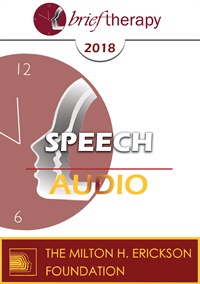BT18 Speech 13 - Couple Therapy: Shared Principles of Governance - Stan Tatkin, PsyD, MFT
- Average Rating:
- Not yet rated
- Topic Areas:
- Speeches | Couples Therapy | Relationships
- Categories:
- Brief Therapy Conference | Brief Therapy Conference 2018 | Pioneers in Couples and Family Therapy
- Faculty:
- Stan Tatkin, PsyD, MFT
- Duration:
- 1:11:45
- Format:
- Audio Only
- Original Program Date:
- Dec 09, 2018
- License:
- Never Expires.
Description
Description: This one-hour speech focuses on what all couple therapists should at least consider: social justice and fairness agreements between partners. The human primate is warlike, self-centered, mostly automatic, and given to flights of fancy, moodiness, and other unpredictable feelings, thoughts, and behaviors. Thus, the social science predicate of civilization dictates that, to hold human beings accountable, there must be agreements between individuals that protect them from one another.
Short Description: This one-hour speech focuses on what all couple therapists should at least consider: social justice and fairness agreements between partners. The human primate is warlike, self-centered, mostly automatic, and given to flights of fancy, moodiness, and other unpredictable feelings, thoughts, and behaviors. Thus, the social science predicate of civilization dictates that, to hold human beings accountable, there must be agreements between individuals that protect them from one another. Shared principles of governance points to the matter of partners governing each other and everyone else as the couple is the smallest unit of a society. Principles are hierarchically more personal and self-governing than rules or laws. In other words, principles speak to character.
Educational Objectives:
- List at least three psychological leaders in the field of social justice and moral reasoning.
- Apply and describe at least three interventions for getting partners to formulate their shared principles of governance.
- Differentiate and describe the differences between rules, laws, and principles.
*Sessions may be edited for content and to preserve confidentiality*
Credits
Handouts
| Ericksonian Learning Snapshot (249.6 KB) | 2 Pages | Available after Purchase |
Faculty

Stan Tatkin, PsyD, MFT Related Seminars and Products
Stan Tatkin, PsyD, MFT, is a clinician, researcher, teacher, and developer of A Psychobiological Approach to Couple Therapy (PACT®). He has a clinical practice in Calabasas, CA, where he has specialized for the last 15 years in working with couples and individuals who wish to be in relationships. He and his wife, Tracey Boldemann-Tatkin, developed the PACT Institute for the purpose of training other psychotherapists to use this method in their clinical practice.


